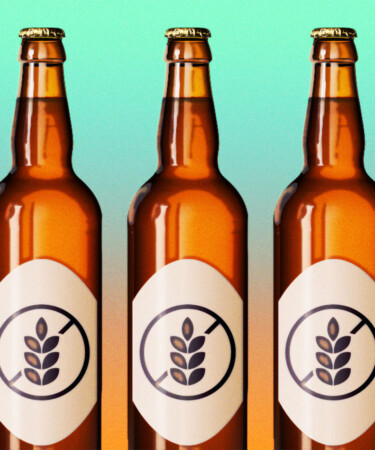When avoiding gluten for health-related reasons, it can be a serious struggle to know if something is completely safe to consume. And as a wheat-based product, beer appears on many lists as a hard no for drinkers avoiding gluten. But similar to the advancements companies have made with other gluten-free products — including bread itself — brewers have made great strides in perfecting the process of producing good suds sans gluten. Still, it can still be tricky to spot when a beer is totally gluten-free, as there are several different processes to reduce gluten in the final product. That’s why VinePair tapped Kelly McKnight, the satellite lead brewer at New Belgium brewery — which crafts both normal and gluten-free beers — to help decipher the different types of gluten-free brews and clarify if any beer can be truly gluten-free.
McKnight says that it’s important to distinguish between two main styles of gluten-conscious brew: gluten-free beer and gluten-reduced beer. “Gluten-free beers are brewed with gluten-free ingredients from the beginning,” McKnight explains. “Gluten-reduced beers are brewed with things such as malted barley that do have gluten in them. Then, brewers use certain enzymes added to the mash or at other points in the process that cleave gluten proteins below 20 ppm and make them easier for people with gluten sensitivity to process.” So while beers totally devoid of gluten are made from atypical ingredients not including wheat, gluten-reduced beers are made normally then chemically modified. Making 100 percent gluten-free beers is quite rigorous, so many companies opt for the latter.
New Belgium, known for its classic Fat Tire Ale and popular Voodoo Ranger line of IPAs, makes a gluten-free version of Abbey, its Belgian-style dubbel. To achieve this, the New Belgium team has had to work to source zero-gluten ingredients and ensure the production area is not exposed to any contamination. McKnight mentions that the brand has a close relationship with Grouse Malt House in Wellington, Colo., a company that specializes in milling gluten-free malt out of ancient grains. McKnight works with Twila Soles, maltstress and CEO of Grouse Malt House, to craft special roasts to replicate the specific style of beer, like the dubbel, in gluten-free form.
Another consideration is the yeast used to ferment the batch. McKnight advises that brewers have to harvest yeast that has either come from a previous gluten-free brew or is a fresh “pitch” from a gluten-free facility to ensure there’s no cross-contamination. Beyond the contents of the beer, the brewing apparatus is also extremely important to the process. McKnight details the meticulous cleaning procedures that are essential if you aim to make a brew totally free of gluten.
“There’s a lot that goes into creating a gluten-free beer outside of just the fermentable ingredients,” she says. “All of the equipment that touches the process of that particular beer has to have certain cleaning regimens checked off after a non-gluten beer has gone through the system.”
So, yes, some beers can be truly gluten-free. Many gluten-sensitive drinkers can enjoy beer made in either gluten-free or gluten-reduced processes, and your doctor can provide insight based on your specific health concerns. But if you want to make sure your can is completely devoid of gluten, make sure to check the label for that gluten-free or gluten-reduced distinction.
